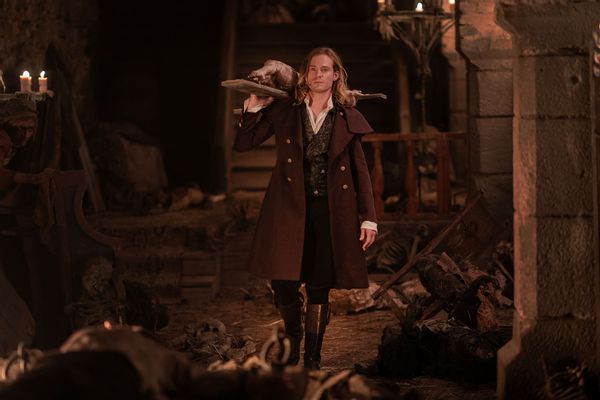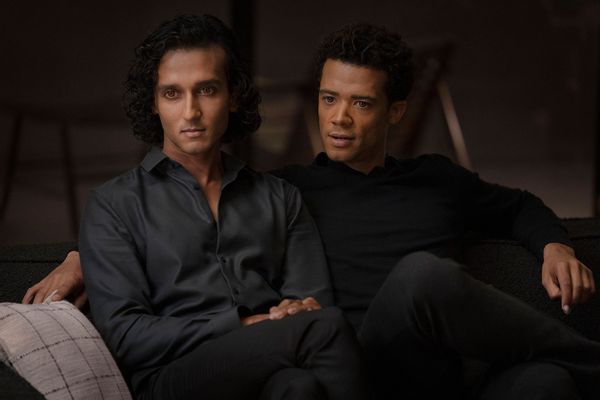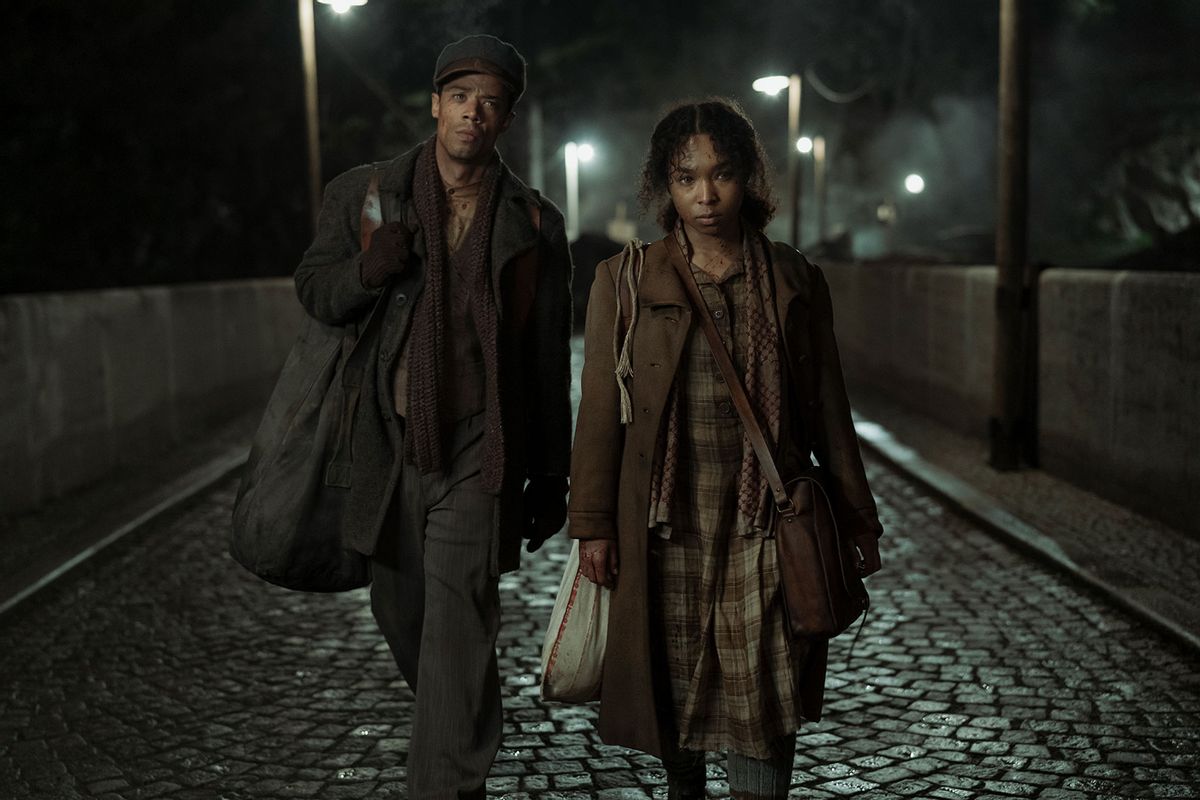What is time to an immortal? “Anne Rice’s Interview with the Vampire” cannot help but ask versions of that question as it applies to individual figures or encapsulates the species’ dilemma.
In the TV adaptation’s second season, Louis de Pointe du Lac (Jacob Anderson) fixates on memories of his unnaturally long lifetime in human terms as a function of trying to recall the details with conciseness. Centuries-old vampires like his current lover Armand (Assad Zaman) or his maker Lestat de Lioncourt (Sam Reid) take a longer view: once all natural means of mortality are removed from the moral equation of living, day-to-day and year-to-year particulars cease to concern them.
As long as there is blood, there is a means to endure.
Decades, epochs and waves of cultural change wash over them. But Louis hasn’t been undead for that long. He’s still furiously treading the waters of his guilt to keep from drowning in it. That anchors him to his years and times more firmly than most.
The bulk of “Interview of the Vampire” stares into the past through the eyes of unreliable narrators, all of whom want to present themselves as more noble and heroic than they are, or at least to have the reader’s understanding if not their benediction.
If that were all this show offered, to paraphrase the crescendo of one of Anderson’s impassioned monologues in the second season premiere, maybe that would be enough. Rice’s “Vampire Chronicles” are broadly known and loved, after all. Already there are fans on subreddits wondering when and whether characters from future novels will make an entrance.
But creator and showrunner Rolin Jones’ inspired changes keep us guessing, along with altering much of the plot’s subtext. Casting Black actors to play Louis and Claudia (first played by Bailey Bass, portrayed this season by Delainey Hayles) opens “Interview with the Vampire” to explorations of race and class exploitation that were never present in Rice’s books.
But the times more palpably sway the story in these new episodes. Ridding themselves of Lestat frees Louis and Claudia, but it also leaves them directionless. At the curious Claudia’s insistence, they journey to Eastern Europe in search of Old World vampires who can help them figure out who they are supposed to be. Since Jones sets the story in the early 20th century, that places them in World War II, a time of mass death and destruction.
As long as there is blood, there is a means to endure.
What sounds like the ideal vacation for a blood drinker is anything but, although a feral Claudia thrives. Preying on the weak suits her lack of concern for human morals although, to keep the audience on their side, we only see her eviscerate Nazi border guards and Soviet soldiers occupying the Romanian village where they eventually land.
 Interview With the Vampire (AMC)Nevertheless, she and Louis are miserable. In New Orleans they slept in luxuriantly lined coffins. Here they hide from the sun in muddy graves. Blood is easy to come by but, as they discover, thin and unsatisfying. Louis says he can never feel warm – a common complaint among vampires, certainly, but in a land ravaged by cruelty it depletes instead of nourishes.
Interview With the Vampire (AMC)Nevertheless, she and Louis are miserable. In New Orleans they slept in luxuriantly lined coffins. Here they hide from the sun in muddy graves. Blood is easy to come by but, as they discover, thin and unsatisfying. Louis says he can never feel warm – a common complaint among vampires, certainly, but in a land ravaged by cruelty it depletes instead of nourishes.
Since AMC’s drama follows the basic contours of the tortured relationship Louis, Lestat and Claudia share in Anne Rice’s 1976 novel, its readers have some sense of how this eight-episode second season progresses.
The seduction of this new season is in the ambiguity of its characters’ true aim and the changeable nature of their desires. Louis and Claudia terminated the agonized trap in which Lestat caught them at the end of Season 1 but, unnaturally, this is not the end of their dealings with him. Neither does it simplify the love triangle they navigate, one fraught with distrust and worry and gorgeous in its sensual gothic splendor.
Lestat haunts Louis, his figment traipsing beside him as he and Claudia roam the miserable dark, searching for clues about where they come from in an ancestral sense to compensate for what their maker denied them. The rift between him and Claudia is only wider and her resentment toward him for cursing her to be trapped in an adolescent body even more caustic.
But some of that is an effect of the blood.
We need your help to stay independent
In “What Can the Damned Really Say to the Damned,” Louis and Claudia land in Romania at the end of the war, where a villager named Emilia (Stephanie Hayes) takes them in, trading vodka and cigarettes for shelter with the rest of her people. A British journalist named Morgan (Blake Ritson) is among them, caught between the Soviet occupiers, rogue German soldiers who don’t realize they’ve lost, and as Emilia grimly hints, maybe something else lurks in the forest.
Precisely what they’re looking for, but not what they’re expecting. As in Rice’s book, the vampires in this part of the world are sickly and barely sentient. Confronting one leads them to Daciana, one of the true ancients, a shriveled crone to whom Claudia offers hope and a few drops of her blood.
The elder rapturously likens the offering to cream from the top of a milk bucket. It is not enough. Before this, we see a small taste of life in this place where humans survive on soup and a few shreds of decency but cannot shake the specter of fear. “Interview with the Vampire” and stories like it are outsider tales; the monsters live among humans but function on society’s margins.
For Louis and Claudia, that’s even more the case although Louis’ refusal to accept that is what draws us and his reluctant biographer Daniel Molloy (Eric Bogosian) to him and seals him in his misery. Hence when Morgan assumes Louis is either a Communist or a deserter in trying to figure him out, his self-characterizations as “a magical vodka Negro having the first alright night in quite a while” is mildly droll and lamentable. But these are humans emerging from a long tunnel of hatred and deadly prejudice, only to replace them with other hatreds and prejudices.
“The humans, there’s too much sadness,” Louis tells Daciana. “Too much pain.” Someone else puts it more plainly: “They don’t want life anymore.”
Want a daily wrap-up of all the news and commentary Salon has to offer? Subscribe to our morning newsletter, Crash Course.
This reading of Louis and Claudia’s lineage allows writer Hannah Moscovitch to transform a station along the characters’ development track into an apologue about war and misery. Moscovitch posits that if the old vampire world is rotten, that is less an effect the organic obsolescence time causes than the necrosis imposed by rampant inhumanity.
 Interview With the Vampire (AMC)Rice’s book is a bloody, romantic, moving journey through loneliness and regret – enough to hold us for a few episodes if the showrunner were to have taken a more literal route. Inviting a deeper reading suggests this adaptation aims to extend its lifespan by appealing to fears and philosophies haunting us now. The kind of rancor and bitterness that ushered forth World War II poisons us too. Hoping for better times keeps us going.
Interview With the Vampire (AMC)Rice’s book is a bloody, romantic, moving journey through loneliness and regret – enough to hold us for a few episodes if the showrunner were to have taken a more literal route. Inviting a deeper reading suggests this adaptation aims to extend its lifespan by appealing to fears and philosophies haunting us now. The kind of rancor and bitterness that ushered forth World War II poisons us too. Hoping for better times keeps us going.
That makes it more of a relief to see Louis and Claudia abandon the sepia grimness of Eastern Europe for a Paris that is reawakening. One assumes the prey tastes better for the usual reasons.
But the despair strangling Romania is not too distant from that place either regardless of how forward-looking it may be. It stalks the City of Lights like Lestat’s apparition stalks his lover, like time itself, although “Interview with the Vampire” makes us content to slow it down for a while.
"Interview with the Vampire" premieres at 9 p.m. Sunday, May 12 on AMC and streams on AMC+.



Shares